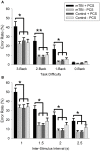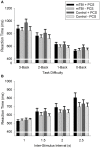Long-term effects of mild traumatic brain injury on cognitive performance
- PMID: 23408228
- PMCID: PMC3569844
- DOI: 10.3389/fnhum.2013.00030
Long-term effects of mild traumatic brain injury on cognitive performance
Abstract
Although a proportion of individuals report chronic cognitive difficulties after mild traumatic brain injury (mTBI), results from behavioral testing have been inconsistent. In fact, the variability inherent to the mTBI population may be masking subtle cognitive deficits. We hypothesized that this variability could be reduced by accounting for post-concussion syndrome (PCS) in the sample. Thirty-six participants with mTBI (>1 year post-injury) and 36 non-head injured controls performed information processing speed (Paced Visual Serial Addition Task, PVSAT) and working memory (n-Back) tasks. Both groups were split by PCS diagnosis (4 groups, all n = 18), with categorization of controls based on symptom report. Participants with mTBI and persistent PCS had significantly greater error rates on both the n-Back and PVSAT, at every difficulty level except 0-Back (used as a test of performance validity). There was no difference between any of the other groups. Therefore, a cognitive deficit can be observed in mTBI participants, even 1 year after injury. Correlations between cognitive performance and symptoms were only observed for mTBI participants, with worse performance correlating with lower sleep quality, in addition to a medium effect size association (falling short of statistical significance) with higher PCS symptoms, post-traumatic stress disorder (PTSD), and anxiety. These results suggest that the reduction in cognitive performance is not due to greater symptom report itself, but is associated to some extent with the initial injury. Furthermore, the results validate the utility of our participant grouping, and demonstrate its potential to reduce the variability observed in previous studies.
Keywords: cognition; head injury; minor; neuropsychological tests; post-concussion syndrome.
Figures
Comment in
-
Anesthesia in Patients With Postconcussion Syndrome: Is There Evidence?J Neurosurg Anesthesiol. 2017 Apr;29(2):185. doi: 10.1097/ANA.0000000000000269. J Neurosurg Anesthesiol. 2017. PMID: 26756503 No abstract available.
References
-
- APA. (1994). Diagnosis and Statistical Manual of Mental Disorders. Washington, DC: American Psychiatric Association
-
- Bailey C. M., Echemendia R. J., Arnett P. A. (2006). The impact of motivation on neuropsychological performance in sports-related mild traumatic brain injury. J. Int. Neuropsychol. Soc. 12, 475–484 - PubMed
-
- Bazarian J. J., McClung J., Shah M. N., Cheng Y. T., Flesher W., Kraus J. (2005). Mild traumatic brain injury in the United States, 1998–2000. Brain Inj. 19, 85–91 - PubMed
LinkOut - more resources
Full Text Sources
Other Literature Sources




